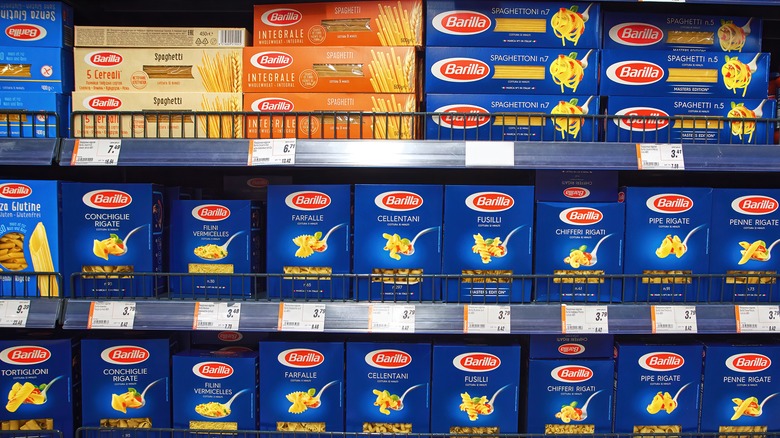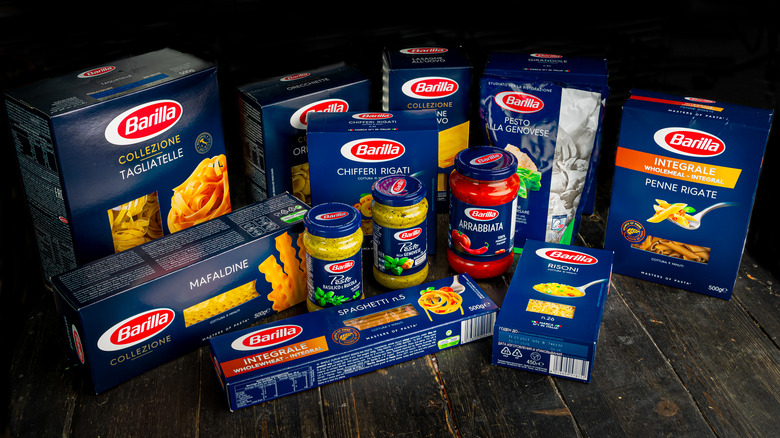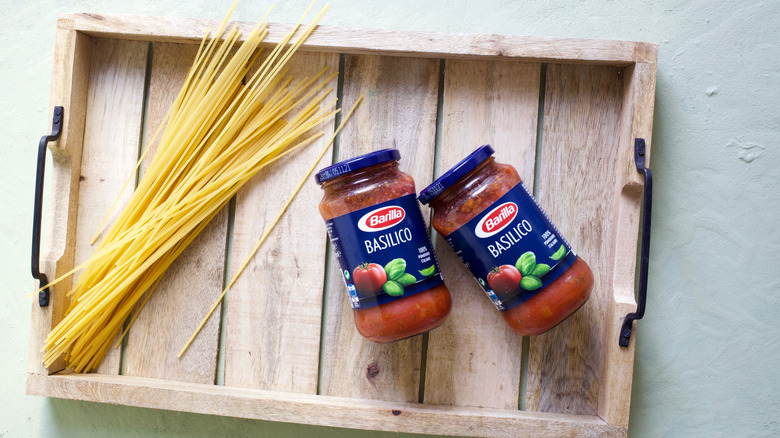Barilla's Advertising Is The Center Of A New Class-Action Lawsuit
It's been a big year for all of us, but for Barilla, the last few months alone have been particularly eventful. In September, the pasta brand launched a "Pasta Season Pack" in anticipation of National Pasta Month. Earlier this month, Barilla released a new premium pasta line called "Al Bronzo," which boasts shapes like Bucatini, Fusilli, and Penne Rigate. The company's latest headline, however, isn't quite as exciting for the company. Barilla's advertising is the center of a new class-action lawsuit.
Barilla's slogan is "Italy's No. 1 brand of pasta," and indeed Barilla has remained the largest single pasta maker in the world as of January 2022, per Reuters. The issue? Barilla isn't actually made in Italy. Talk about truth in advertising — at least, that's what CNN reports former customers Matthew Sinatro and Jessica Prost are saying, who filed the lawsuit against the company. The slogan isn't the only misleading advertisement they're taking issue with, either: Barilla pasta is packaged with the colors of the Italian flag, and its advertising alludes to the idea that the product's ingredients are sourced from Italy. Still, whether or not this is enough grounds to prove any intent to deceive is questionable.
A Barilla spokesperson provided Tasting Table with a statement on the matter, sharing "Barilla remains committed to vigorously defend against these unfounded claims, as the wording on the box clearly states: 'Made in the U.S.A. with U.S.A. and imported ingredients.' We're very proud of the brand's Italian heritage, the company's Italian know-how, and the quality of our pasta in the U.S. and globally."
Barilla brands itself as an Italian company
Per the court case, the plaintiffs maintain that "authentic Italian products, including pastas, hold a certain prestige and [are] generally viewed as a higher quality product," and that "the general 'Italianness' of a product influences consumers['] overall evaluation of a product," (via Courthouse News Service). They allege that Italian-made pasta is a hot commodity on the global market and consumers are willing to pay more for it, a fact they say Barilla is cognizant of and is actively exploiting.
While Barilla is now the biggest pasta company in the world, it started as a standalone bread and pasta shop that opened in Parma, Italy in 1877. Emphasizing its "Italianness" would seem like a natural and arguably reasonable advertising move for the company. Plus, as the court case itself notes, Italy doesn't produce enough durum wheat to make all the pasta Barilla sells. According to Britannica, Italy is home to just over 5 million acres of dedicated wheat farmland, a massive drop from 12 million acres during the 1940s. For reference, in 2021, the United States had 37.2 million acres of wheat farmland, per the USDA. Barilla isn't making any attempt to hide its ingredient sourcing, either.
Plaintiffs demand more up-front transparency
A quick visit to Barilla's website will tell potential customers all they need to know about where the company manufactures its product: "Barilla Pasta that is sold in the United States is made in our plants in Ames, IA and Avon, NY, with a few exceptions. Barilla Tortellini and Barilla Oven Ready Lasagne are made in Italy. Our Barilla Italy products state 'Product of Italy, Distributed by Barilla America, Inc.' on the packaging. We also have product that is made in Canada." Yet, per the court case, the plaintiffs argue that Barilla does not make this clear on their actual products (via Courthouse News Service).
In June, energy bar brand Clif faced a similar advertising suit for labeling its product as "nutritious" despite its high sugar content, per FoodNavigator U.S.A. At the time, Clif commented in the lawsuit that, "A reasonable consumer would know that the challenged products contained added sugars, and that the sugars were part of the promise of energy." Still, the case ended in a settlement of $10.5 million. Time will only tell what happens for Barilla.


